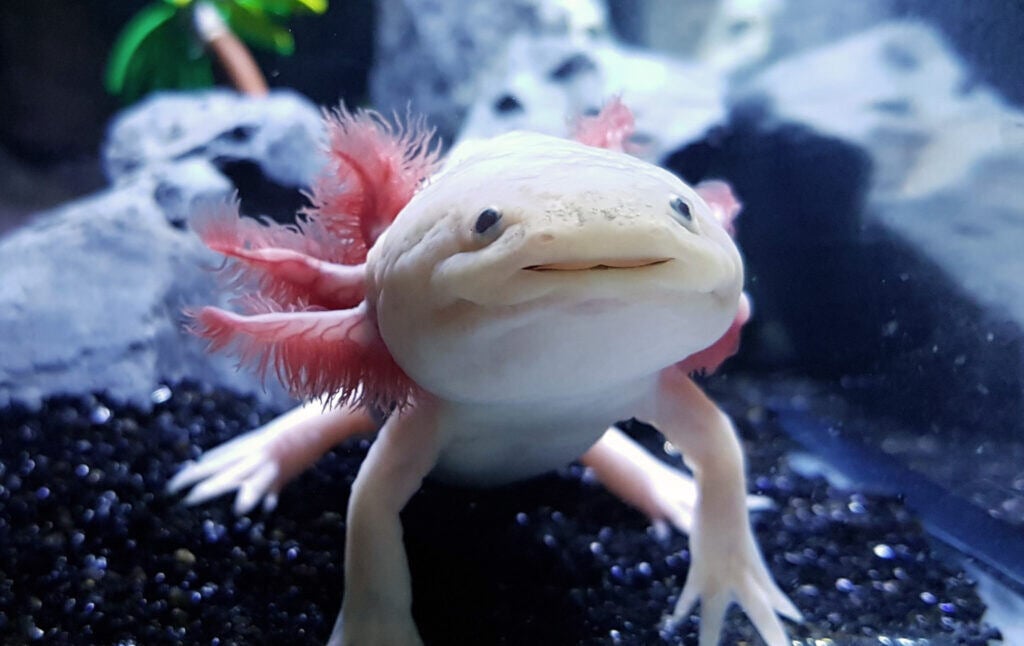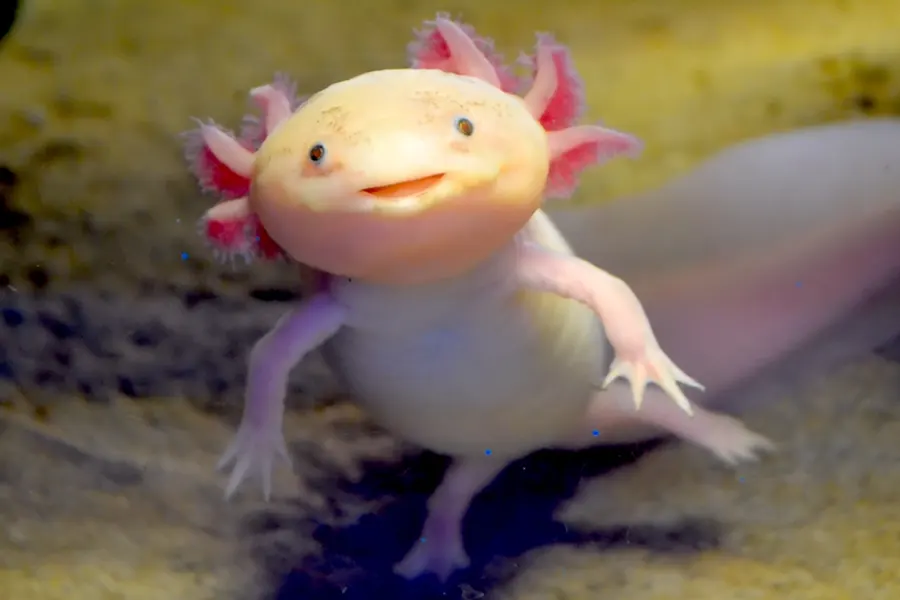
We Adopted An Axolotl and You Should Too
These fascinating creatures are critically endangered. “Adopt” one to help conserve them!
The axolotl is a weird little guy. They’re a type of salamander that lives in Mexico. They are fun to look at, because they have a set of physical characteristics that makes them look extremely cute to humans. They often look like they’re smiling, and it’s difficult to remind yourself that just because an animal looks to us like it’s smiling, doesn’t mean it’s actually smiling or happy. Remembering this is not enough to overcome the impression, though, and it’s hard not to think of them as cheerful and delightful.
The axolotl is actually interesting to science, because it has impressive powers to regenerate bits of itself after they have been damaged. The axolotl can even regenerate new brain cells, which I wish I could do after reading through Twitter posts for more than a few minutes. Axolotl brain regeneration is being studied to see if it holds any clues for how we might help humans with serious brain injuries.

Some other fun axolotl facts: they breathe through those feathery things on the sides of their heads, which are gills. They can live for 15 years if well cared-for. They can be up to a foot long. They live entirely underwater, unlike other salamanders. And they exist in a kind of perpetual youth, because they don’t outgrow their larval stage. They are the “Peter Pan of salamanders.”
Unfortunately, a less fun axolotl fact is that they’re critically endangered. Axolotls are only found in a small complex of lakes in Mexico, and pollution has killed a huge number of them off. The axolotl population has declined by a horrifying 99.5 percent. They’re just being completely wiped out, like so many other animals.
Now there’s a campaign to save the axolotls. Mexico’s National Autonomous University gives the public the chance to “adopt” an axolotl. It costs $30. You don’t get to take it home with you. It stays in Mexico. But you know you’re doing your axolotl some good, and funding the conservation effort. (For a smaller donation, you can “buy an axolotl a meal.”)
Current Affairs has, of course, adopted an axolotl. The form makes you choose whether you want a male or female axolotl. I chose a female. Then it asks you to name it. I named ours “Seymour,” because I forgot that I had chosen a female axolotl (and because gendered naming conventions are arbitrary). Supposedly we’ll be getting an “adoption kit” soon with more information and a certificate, as well as updates on how our axolotl is doing.
I would like to point out that the holidays are coming up, and if you’re looking for a slightly offbeat gift idea, adopting an axolotl in someone’s name is entirely charming. (You could also give them a plush axolotl at the same time, of which there are astonishingly many types available online.) It’s for a good cause. These fascinating little creatures need help, and for a small sum you can help the effort to keep the species going.

Now, I have to note briefly that axolotls are, in many ways, an easy creature to care about because of their “cuteness” and because they’re weird and interesting. Human beings have biases toward certain species that are entirely arbitrary, with the so-called “charismatic megafauna” getting outsized attention. We have to remember that the value of an animal’s life does not depend on whether it’s “cool,” and I recommend reading Kecia Doolittle’s recent piece in this magazine about her effort to save a couple of neglected turkeys from a factory farm. The axolotl got lucky enough in the genetic lottery to attract human sympathy with its quasi-smile. A lot of the other creatures we kill by the millions do not tug the heartstrings in the same way. The animal rights movement is based around the idea that it’s animals’ experiences and intrinsic value, not their outward appearances, are what matter. Likewise, it shouldn’t matter whether they can contribute to important scientific research about regenerating neurons. We need a respect for animal life that isn’t particular to the animals we happen to be drawn to.
Nevertheless: the axolotl campaign does good, and you can feel good about helping them. I recommend using it to start broader conversations around animal rights. But I also think it’s just a really nice thing to get someone to show them you care. What says “I love you” like an axolotl adoption certificate?

“I was friend of the lions and panthers, but had never gone into the dark, humid building that was the aquarium. I left my bike against the gratings and went to look at the tulips. The lions were sad and ugly and my panther was asleep. I decided on the aquarium, looked obliquely at banal fish until, unexpectedly, I hit it off with the axolotls. I stayed watching them for an hour and left, unable to think of anything else.” – Julio Cortazar, “The Axolotl”




